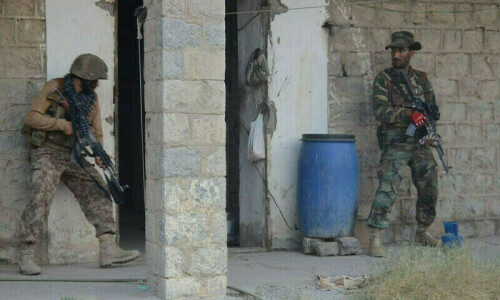
In Cairo, the tumult of a new democracy led the hardline Salafist party al Nour to call its supporters to the streets, in a display of power not too unfamiliar for residents of Karachi. Answering the call on Friday, September 14th, swarms of angry protestors broke through barriers, overran police checkpoints and managed to enter the US Embassy compound, tearing down and burning the US flag. As the situation continued to boil over at home and draw sharp rebuke abroad, Egypt’s new President Mohamed Morsi found himself in a tough situation – while international obligations may mandate the protection of foreign embassies and the US-Egyptian relationship may need salvaging, the anger of the populace over an anti-Islam video and the support base of Morsi’s Freedom and Justice party would demand swift condemnation.
As MK Bhadrakumar writes in Asia Times, “Simply put, he could sense Arab streets heaving with fury toward the US and he decided that it would be politically injudicious for him to do anything other than let the popular anger play out.” After initial dithering, which drew criticism from the US government, Morsi finally did respond, pledging to protect all diplomatic installations and calling on his countrymen to honor their “duty to protect our guests and visitors from abroad.” Following Morsi’s announcement, al Nour called off their own demonstrations scheduled for the 21st, allowing the Muslim Brotherhood to lead peaceful protests in Cairo, ensuring protests remained peaceful and bolstering their own credentials amongst their base.
In Libya a more dramatic turn of events led to the sacking of the headquarters of a prominent civilian militia and the start of voluntary disarmament campaigns, only days after an angry mob torched the US Consulate in Benghazi. Following the murder of Ambassador Stevens, up to 30,000 peaceful protestors gathered in the main square in Benghazi, expressing their outrage over the attack, demanding the disbanding of civilian militias across the city. As momentum continued to build, protestors, joined by police, stormed the headquarters of militant group Ansar al Sharia, chanting “No to militias”. The eviction of Ansar al Sharia has altered the relations of state-society relations in Libya, with citizens – somewhat peacefully – demanding an end to the rule of militias and a disarming of society. As unlikely as it seemed, in Libya the people of Benghazi were able to rise Phoenix-like from the ashes, reclaim weeks of bloodshed and use it to effect positive change. Already, disarmament campaigns are underway, with citizens voluntarily turning in weapons in hopes of building a better future from the rubble of the past few weeks.
The lessons learnt from the streets of Cairo and Benghazi has particular salience for Pakistan. In the lead-up to massive protests across the country, the government did – with limited success – try to learn from their counterparts and ensure either that protests remained peaceful, or that some steps were taken to limit the possibility of civilian injuries. Despite the inconvenience caused, by declaring a public holiday and switching off cellular networks, the government did try as strongly as possible to ensure people stayed at home on Friday – indeed, beyond protestors and security forces, most of Pakistan’s major metropolises resembled ghost towns on Yaum-i-Ishq-i-Rasool. Additionally, through sanctioning official protests, efforts were made to try and channel public outrage towards peaceful, officially-sanctioned protests, as illustrated in Lahore, rather than the wanton, senseless violence witnessed in Karachi and Islamabad.
These steps did fail to keep protests peaceful and resulted in deaths and the destruction of millions of rupees worth of property, but a worthwhile question arises – could more have been done to channel anger in a peaceful direction? What steps could’ve been taken that weren’t? Even in the case of Libya and Egypt, it was only after the initial violence and chaos that peaceful, constructive dialogue could begin. As a nation, we’ve had more than our share of violence and chaos, we must now ask ourselves if we’re ready to make a constructive dialogue.

The views expressed by this blogger and in the following reader comments do not necessarily reflect the views and policies of the Dawn Media Group.














































